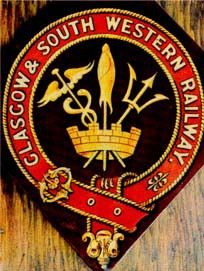Glasgow and South Western Railway: Difference between revisions
Jump to navigation
Jump to search
Knorrepoes (talk | contribs) m (Text replacement - "↵↵''' {{uc" to "''' {{uc") |
Knorrepoes (talk | contribs) m (Text replacement - "{{uk}}''' {{uc:{{PAGENAME}}}} '''" to "''' {{uc:{{PAGENAME}}}} '''") |
||
| (One intermediate revision by the same user not shown) | |||
| Line 1: | Line 1: | ||
''' {{uc:{{PAGENAME}}}} ''' | |||
[[File:{{PAGENAME}}.jpg|center|400 px|Coat of arms (crest) of {{PAGENAME}}]] | [[File:{{PAGENAME}}.jpg|center|400 px|Coat of arms (crest) of {{PAGENAME}}]] | ||
= | {| class="wikitable" | ||
|+Official blazon | |||
|- | |||
|'''English''' | |||
| blazon wanted | |||
|} | |||
===Origin/meaning=== | ===Origin/meaning=== | ||
Latest revision as of 05:06, 4 May 2024
GLASGOW AND SOUTH WESTERN RAILWAY
| English | blazon wanted |
Origin/meaning
Created in 1847 as an amalgamation of the Glasgow, Dumfries & Carlisle with the Paisley, Kilmarnock & Ayr Railway, it also incorporated the oldest Scots railway, the Kilmarnock & Troon.
The company did not use a really heraldic device on its badge: a caduceus of Mercury (messenger of the gods) for speed; the distaff of Minerva (goddess of handicrafts) for local industries and the trident of Neptune for the Ayrshire ports.
Contact and Support
Partners:
Your logo here ?
Contact us
© since 1995, Heraldry of the World, Ralf Hartemink 
Index of the site










